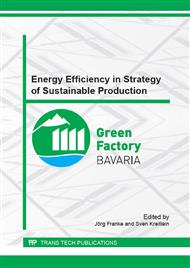p.25
p.32
p.38
p.46
p.53
p.61
p.67
p.73
p.79
Ontology-Based Description of Energy Optimization Potentials for Production Environments
Abstract:
Energy efficiency of production systems and of the product itself has grown to a critical competitive factor. Besides the manufacturer’s monetary motivation there are increasing incentives to meet customers’ expectations regarding lifecycle cost and the ecological footprint of products. That neo-ecology, as one megatrend, leads to a new business moral resulting in an energy optimization of the whole product life cycle in terms of resource and energy input. There is a plenty of measures to reduce the energy consumption of a production system and thus to increase its efficiency. To do so companies do not have to develop proprietary solutions for their production sites but can draw on a large pool of measures. However, in practice, many energy optimization measures are unknown to their energy managers. This is mainly owing to the fact that there is no standardized categorization for energy optimization potentials yet. In addition, many efficiency deficits remain undetected as a result of a non-existing efficient methodology for finding energy consumption optimization measures. The domain of information retrieval addresses this issue, as it is able to provide documents matching the user’s information demand. Nevertheless, search queries have to be sufficiently well known in order to gain adequate results. In this paper we show how ontologies can be used to support the user in defining search queries and finding optimization measures efficiently. As formal and explicit specifications of shared conceptualizations, ontologies offer the possibility to represent relevant parts of knowledge in a standardized, machine-readable manner. Therefore, ontologies improve upon data models, which are mainly used for single applications. For the purpose of energy efficiency in production environments, we provide both a methodology to build ontologies for describing energy saving measures and illustrate the application for explicit energy efficiency optimization measures.
Info:
Periodical:
Pages:
53-60
DOI:
Citation:
Online since:
November 2015
Authors:
Price:
Сopyright:
© 2015 Trans Tech Publications Ltd. All Rights Reserved
Share:
Citation:


